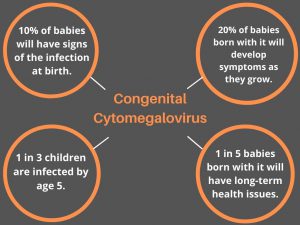Did you know that nearly 1 in 3 children in the U.S. are infected with cytomegalovirus (CMV) before the age of 5? According to the CDC, around 1 out of every 200 babies is born with congenital CMV, with many having long-term health problems because of it. Like shingles, the cytomegalovirus remains in the body for your entire life and can reactivate at any time. Most people have never heard of congenital cytomegalovirus, and since June is National Congenital Cytomegalovirus Awareness Month, we wanted to raise awareness by talking about this common virus, how it affects those who have it, and ways to prevent it.
What Is Cytomegalovirus?
Cytomegalovirus is a virus related to the herpes virus group of infections. Once a person is infected with it, they essentially have it for life, and it can reactivate at any time, particularly in those with weakened immune systems. It affects people of all ages, and about 0.6% of babies born in the U.S. are infected with it. Here are some important statistics to know:
- About 10% of babies with congenital cytomegalovirus will have signs of the infection at birth.
- About 20% of babies born with it will develop symptoms as they grow.
- Nearly 1 in 3 children are infected with CMV by age 5.
- Around 1 in 5 babies born with CMV will have long-term health issues.
- Over half of all adults have been infected with CMV by age 40.
Causes
CMV is common in people of all ages because it is relatively easy to transmit: the virus lives in urine, tears, semen, blood, breast milk, and other bodily fluids and can be spread through direct contact with any of these fluids, including through sexual contact. Daycare centers and households can harbor the virus, and it is also often passed from mothers to babies during pregnancy. A pregnant woman can pass CMV to her fetus through primary infection, reinfection with a different strain, or reactivation of the infection. Risk of transmission is 30-40% in the first and second trimesters and 40-70% in the third trimester. The risk of complications for the baby is greatest if the infection occurs during the first trimester.
Symptoms

Most people with cytomegalovirus have no symptoms and do not even know that they have been infected, which is another reason it is so easily transmitted to others. About 90% of babies with the infection will experience no immediate symptoms, but low birth weight can be one sign that they have the virus. Other signs of congenital cytomegalovirus include:
- Jaundice
- Prematurity
- Lung infection
- Anemia
- Inflammation of the retina
- Rash at birth
- Seizures
- Small head size
If your baby is treated early, there should be no issues stemming from CMV as they get older. But if treatment is delayed, they could suffer from serious health issues. About 40-60% of babies with congenital cytomegalovirus will have long-term health issues, including:
- Hearing loss
- Seizures
- Intellectual disability
- Vision loss
- Small head size
- Lack of coordination

Diagnosis & Treatment
For adults, blood tests can be done to diagnose CMV, but this is not the case for babies. For congenital cytomegalovirus to be detected in newborns, tests on saliva or urine need to be done, preferably within 3 weeks of their birth. If there are signs of congenital CMV at birth, antiviral medications, such as ganciclovir or valganciclovir, can help reduce hearing loss later in life and the possibility of developmental delays. Regular hearing and vision tests should be conducted throughout the child’s life. Physical therapy might be recommended for children with delayed motor skills.
Prevention
CMV is a common infection, and there is no cure for it. Vaccines to protect against CMV are in the experimental stages of development. In order to prevent congenital cytomegalovirus, pregnant women should try to limit exposure to the virus by washing their hands thoroughly with soap and water, and by avoiding sharing food or drinks with other people during their pregnancy.
Most infants with congenital cytomegalovirus will grow up healthy, especially if the virus is detected early. Conducting regular hearing and vision tests is recommended, which can be costly for people with insufficient health insurance coverage. Having the right health insurance plan for your needs is important so you don’t have to face any large bills that can lead to medical debt. If you are considering a new plan or want to see the options available to you, EZ can help. Our agents will assess your financial and medical needs, and will compare plans from the top-rated insurance companies in your area in minutes. To get free quotes, simply enter your zip code in the bar above, or to speak with a licensed agent, call 888-350-1890. No hassle or obligation.
